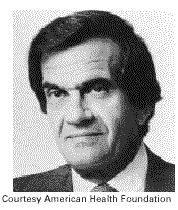 |
|
|
|
|
|
|
| ||||||||||
|
|
|
|
|
|
|
||||
| ||||||||||
|
|
|
|
|
Persons using assistive technology might not be able to fully access information in this file. For assistance, please send e-mail to: [email protected]. Type 508 Accommodation and the title of the report in the subject line of e-mail. Ernst L. Wynder, M.D.
Although cigarettes were considered a symbol of popularity and social acceptability from the opening of the 20th century, critics warned of the dangers of what they called "coffin nails," or "little white slavers." They implicated cigarettes in cancer, heart disease, and other serious health problems; however, opposition to the cigarette would gain little ground until compelling scientific evidence linked smoking and disease. Researcher, educator, and activist Ernst Wynder, M.D. (April 30, 1922-July 14, 1999), dedicated his career to producing this evidence. Ernst Wynder was born in Herford, Germany. His family emigrated to New Jersey in 1938 to escape Nazi persecution. He attended medical school at Washington University, St. Louis, Missouri, and received both a bachelor of science and a medical degree in 1950. Wynder began his lung cancer investigations when he was a medical student. While attending a summer internship at New York University, his curiosity was piqued during the autopsy of a two-pack-a-day smoker who had died from lung cancer. Wynder began collecting case histories of lung cancer victims, first in New York City and then in St. Louis. His research brought him to thoracic surgeon Evarts Graham, who, despite initial skepticism about Wynder's premise (Graham was a heavy smoker), granted access to his extensive case records, and agreed to sponsor the medical student. In 1950, the Journal of the American Medical Association published Wynder and Graham's "Tobacco Smoking as a Possible Etiologic Factor in Bronchiogenic Carcinoma: A Study of 684 Proven Cases." Wynder and Graham's retrospective study was not the first to link smoking and cancer, but its sophisticated design, impressive population size, and unambiguous findings demanded attention and further research. During the next decade, hundreds of reports were published linking cancer and smoking, including large prospective studies, pathologic, and animal investigations. A second effect was to convince doctors that the health risks of smoking were serious. Many gave up the habit, including Graham, who quit smoking in 1952. Too late, it would seem, as he wrote to Wynder in 1957, weeks before the surgeon died from lung cancer. Wynder devoted his career to the study and prevention of cancer and chronic disease, writing hundreds of scientific papers advocating further research and public education. Through the 1950s and 1960s he worked at the Sloan-Kettering Institute for Cancer Research; in 1969, he founded the American Health Foundation, serving as its medical director. In 1972, the foundation launched Preventive Medicine, with Wynder as editor. In 1999, the foundation employed approximately 200 researchers representing medicine, public health, biology, chemistry, nutrition, and behavior science. Wynder endured years of criticism from the tobacco industry and skepticism from many researchers, but he remained determined. Bibliography Brandt A. The cigarette, risk, and American culture. Daedalus 1990;119:155-76. Kluger R. Ashes to ashes: America's hundred-year cigarette war, the public health, and the unabashed triumph of Philip Morris. New York: Knopf, 1996. Steinfeld JL. Smoking and lung cancer: a milestone in awareness. JAMA 1985;263:2995-7. Wynder EL. A corner of history: micro-epidemiology. Prev Med 1973;2:465-71. Wynder EL, Graham E. Tobacco smoking as a possible etiologic factor in bronchiogenic carcinoma: a study of 684 proven cases. JAMA 1950;143:329-36. Disclaimer All MMWR HTML versions of articles are electronic conversions from ASCII text into HTML. This conversion may have resulted in character translation or format errors in the HTML version. Users should not rely on this HTML document, but are referred to the electronic PDF version and/or the original MMWR paper copy for the official text, figures, and tables. An original paper copy of this issue can be obtained from the Superintendent of Documents, U.S. Government Printing Office (GPO), Washington, DC 20402-9371; telephone: (202) 512-1800. Contact GPO for current prices. **Questions or messages regarding errors in formatting should be addressed to [email protected].Page converted: 11/4/1999 |
|||||||||
This page last reviewed 5/2/01
|